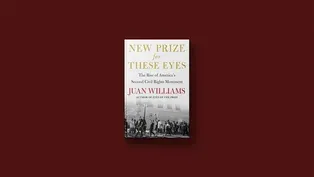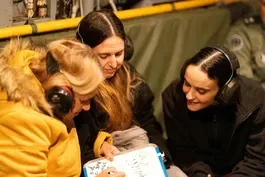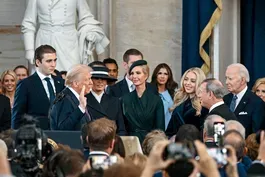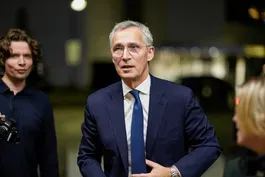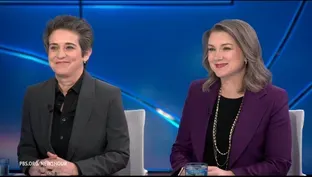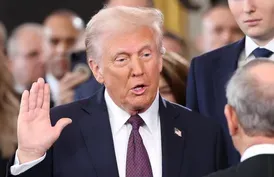
Biden issues preemptive pardons on his way out of office
Clip: 1/20/2025 | 6m 11sVideo has Closed Captions
Biden issues preemptive pardons on his way out as Trump says he'll pardon Jan. 6 rioters
President Trump is reportedly planning to issue a sweeping series of pardons for defendants charged in the Jan. 6 attack on the U.S. Capitol. That's as Joe Biden, in one of his final acts as president, issued preemptive pardons to Dr. Anthony Fauci, retired General Mark Milley and members of the House committee that investigated Jan. 6. Geoff Bennett discussed more with Mary McCord.
Major corporate funding for the PBS News Hour is provided by BDO, BNSF, Consumer Cellular, American Cruise Lines, and Raymond James. Funding for the PBS NewsHour Weekend is provided by...

Biden issues preemptive pardons on his way out of office
Clip: 1/20/2025 | 6m 11sVideo has Closed Captions
President Trump is reportedly planning to issue a sweeping series of pardons for defendants charged in the Jan. 6 attack on the U.S. Capitol. That's as Joe Biden, in one of his final acts as president, issued preemptive pardons to Dr. Anthony Fauci, retired General Mark Milley and members of the House committee that investigated Jan. 6. Geoff Bennett discussed more with Mary McCord.
How to Watch PBS News Hour
PBS News Hour is available to stream on pbs.org and the free PBS App, available on iPhone, Apple TV, Android TV, Android smartphones, Amazon Fire TV, Amazon Fire Tablet, Roku, Samsung Smart TV, and Vizio.
Providing Support for PBS.org
Learn Moreabout PBS online sponsorshipGEOFF BENNETT: Donald Trump, now the first convicted felon sworn in as commander in chief, says he plans to issue a sweeping series of pardons for defendants charged in the January 6, 2021, attack on the U.S. Capitol.
That's as Joe Biden and one of his final acts as president this morning issued preemptive pardons to Dr. Anthony Fauci, retired General Mark Milley and members of the House committee that investigated the January 6 attack on the Capitol to prevent potential revenge by the new Trump administration.
For more, let's bring in Mary McCord.
She's a former acting assistant attorney general for national security and now teaches at Georgetown Law School.
Thanks for being back with us.
We appreciate it.
So, when Donald Trump says he plans to issue a sweeping set of pardons for the January 6 rioters and he's reportedly planning to commute the prison sentences of hundreds of his supporters who have been convicted of violent attacks against law enforcement on January 6, what are the implications of that?
MARY MCCORD, Former Justice Department Official: Well, I think it really does damage to our criminal legal system.
I mean, pardons are certainly given by presidents of both parties.
The typical -- and we have seen some unusual uses of pardons recently, which I know we're going to talk about.
But when we're talking about people like the January 6 attackers, over 1,200 of which have been convicted, 1,000 of those have pled guilty, another 250 or more have been found guilty after a trial, then we're talking normally, in those type of situations, a pardon is an act of mercy when somebody, the person convicted has changed their life for the better, served a substantial amount of time.
There's been mitigating circumstances that make a president feel like it would be unfair to continue to incarcerate that person.
Sometimes, it's because sentencing laws have changed and people sentenced under old regimes are serving what now seem to be draconian sentences.
But this is very different.
This is part -- at least if you listen to what President Trump says, it's not about an act of mercy and forgiveness for what people have done that it violates the law.
It's part of his entire false narrative that there was no crime, that this was a peaceful protest and that those who've been charged and convicted are hostages.
So I think it does real damage to our criminal justice system.
Each one of these defendants has had due process of law.
They have had attorneys to counsel them.
They have had jury trials if they wanted to go to trial.
Their constitutional rights have been respected.
And it's part of our adherence to the rule of law that those are not just the kind of people that you just said you're going to give blanket pardons to, or even in the cases you were mentioning commutations.
GEOFF BENNETT: Well, let's talk separately about the pardons that President Biden -- former President Biden issued this morning as one of his final acts to the high-profile Trump targets, Dr. Anthony Fauci, Mark Milley, members of the committee that investigated the January 6 attack, and also to include his siblings and siblings-in-law, given that some on the right said that they should be prosecuted.
Novel use of the presidential pardon power.
What questions does it raise?
MARY MCCORD: So this is also extraordinary.
And as President Biden said, this was really because of the exceptional circumstances we're in, where Donald Trump and those around him have repeatedly over the course of the campaign and really the course of the last four years talked about retribution, right, talked about going after those who have come after him, and actually named many of these people by name, named Mark Milley, named Anthony Fauci, named Liz Cheney, and other members of the select committee.
So I think what President Biden felt was a sort of a moral obligation to try to protect them from unfounded, baseless investigations and prosecutions, because even though I think he, like I, have faith that people who did not commit any crime, ultimately, there are other guardrails in the system that would prevent them from being convicted, but it can be expensive and emotionally and psychologically incredibly draining for the person who's targeted in their families if you are put through an investigation that's utterly baseless.
So it was extraordinary.
And similarly, with his family members, it's again, it's this concern about retribution.
And that concern is well-founded, because it's something that Donald Trump and others close to him, including his nominee for the FBI director, have threatened.
GEOFF BENNETT: Understanding the concern, what's the precedent that's set by handing out pardons to people who have yet to be convicted, not even investigated for a crime?
MARY MCCORD: So there is some precedent for something like this, including President Carter's blanket pardons for draft dodgers after Vietnam, I mean, including people who hadn't been identified by the government or investigated.
But, as you indicated with your previous question that I now realize I didn't fully answer, there certainly are questions that could be raised.
One of those questions is, does the person have to accept the pardon for it to be effective?
And if it's accepted, would that preclude or would that mean that person does not have any Fifth Amendment rights to invoke if ever called to testify in a different type of proceeding, let's say, a congressional proceeding?
And the Supreme Court has held that a person can reject a pardon.
And, in fact, the case rejecting it was a case -- a case where they held that was a case where the beneficiary of a pardon rejected it.
So there are some questions to be raised, but, right now, we will just have to wait and see whether there are any investigations launched.
GEOFF BENNETT: Mary McCord, our thanks to you, as always.
We appreciate you being with us this evening.
'New Prize for These Eyes' details 2nd civil rights movement
Video has Closed Captions
Juan Williams details 2nd civil rights movement in 'New Prize for These Eyes' (7m 31s)
News Wrap: 3 Israeli hostages released as ceasefire holds
Video has Closed Captions
News Wrap: 3 Israeli hostages released as ceasefire appears to be holding (4m 18s)
The power of presidential executive orders and their limits
Video has Closed Captions
The power of presidential executive orders and their limits (4m 29s)
Stoltenberg on how the world is responding to Trump's return
Video has Closed Captions
Former NATO chief Stoltenberg on how the world is responding to Trump's return (6m 6s)
Tamara Keith and Amy Walter on how Trump changed Washington
Video has Closed Captions
Tamara Keith and Amy Walter on how Trump and Washington have changed since his first term (6m 2s)
Trump returns to office and kickstarts ambitious agenda
Video has Closed Captions
Trump returns to office and kickstarts ambitious and controversial agenda (16m 52s)
Providing Support for PBS.org
Learn Moreabout PBS online sponsorshipMajor corporate funding for the PBS News Hour is provided by BDO, BNSF, Consumer Cellular, American Cruise Lines, and Raymond James. Funding for the PBS NewsHour Weekend is provided by...

